Punjab State Board PSEB 8th Class English Book Solutions Poem 3 We Who Love Books Textbook Exercise Questions and Answers.
Class 8th English Solutions Poem Chapter 3 We Who Love Books Question Answers
We Who Love Books Class 8 Questions and Answers
Learning New Words
Activity 1.
Look up the following words in a dictionary. You should seek the following information about the words and put them in your WORDS notebook.
1. Meaning of the word as used in the poem (adjective/noun/verb. etc.)
2. Pronunciation (The teacher may refer to the dictionary or a mobile phone for correct pronunciation.)
3. Spellings. familiar timeless.
| familiar | timeless | refrain |
| verse | companions | nourish |
Activity 2.
Pick up the rhyming words from the poem and make a list.
Answer:
(a) away — stay
(b) down — gone
(c) again — refrain
(d) me — be/free
![]()
Activity 3.
Match the words with their correct synonyms.
| S.No. | Word | Synonym |
| 1. | moment | nutrition |
| 2. | modern | high |
| 3. | clever | time |
| 4. | upset | intelligent |
| 5. | nourishment | new |
| 6. | wealthy | lift |
| 7. | garbage | big |
| 8. | infant | story |
| 9. | tall | old |
| 10. | large | unhappy |
| 11. | companion | bowl |
| 12. | secure | friend |
| 13. | thief | known |
| 14. | dish | trash |
| 15. | ancient | burglar |
| 16. | timeless | rich |
| 17. | familiar | safe |
| 18. | raise | permanent |
| 19. | tale | baby |
| 20. | joy | happiness |
Answer:
1. moment – time
2. modren – new
3. clever – intelligent
4. upset – unhappy
5. nourishment – nutrition
6. wealthy – rich
7. garbage – trash
8. infant – baby
9. tall – high
10. large – big
11. companion – friend
12. secure – safe
13. thief – burglar
14. dish – bowl
15. ancient – old
16. timeless – permanent
17. familiar – known
18. raise – lift
19. tale – story
20. joy – happiness.
![]()
Learning to Read and Comprehend
Activity 4.
Read the following stanzas and answer the questions.
A. Some books I’ll never give away.
Though old and worn, their binding torn,
Upon my shelves they’ll always stay,
Alive, still read, still fresh each dawn,
Their magic moments never gone.
(a) Name the poem and the poet.
Answer:
The name of the poem is ‘We Who Love Books and that of the poet is Ruskin Bond.
(b) The poet doesn’t want to part with some books. Where does he keep them?
Answer:
The poet keeps them on his shelves.
(c) What is the condition of the books ?
Answer:
They are old and worn. Their binding is torn.
![]()
B. Familiar friends, these timeless tales
Have been with me since I was ten,
And as I turn their pages once again
I feel and love their old refrain.
(a) The poet calls his books ‘familiar friends”. Why does he call them ‘familiar’ ?
Answer:
The poet calls his books ‘familiar friends’ because they have been his friends since he was ten.
(b) What do you understand by the phrase ‘timeless tales’ ?
Answer:
‘Timeless tales’ means untouched by time. They are as fresh today as they were years ago.
(c) How does the poet feel when he touches and feels the pages of his books ?
Answer:
The poet’s love for their old refrains.
C. Great verse, great thoughts, still stand the test
Of time that’s passing by so fast.
These good companions never fail
To give me joy, to nourish me.
We who love books will always be
The lucky ones’ our minds set free.
(a) According to the poet, what still stand the test of time ?
Answer:
According to the poet great verse and great thoughts still stand the test of time.
(b) What do you think the poet will always get from his good companions ?
Answer:
The poet will always get joy and nourishment from his good friends.
(c) Who according to the poet will always be the lucky ones ?
Answer:
According to the poet, those who love books will always be lucky ones.
![]()
Activity 5.
Books have been described using many names and adjectives. In the given table, list all the names and adjectives used by the poet to describe books.
Answer:
| Nouns used for books | Adjectives used for describing books |
| binding | some |
| friends | old |
| tales | worn |
| refrains | torn |
| verse | fresh, alive, familiar |
| companions | timeless, great, good |
Learning Language
Tenses Tense is the form of a verb used to show the time of an action or a state. The three main tenses are :
- the Present tense
- the Past tense
- the Future tense
Look at the following sentences :
1. I go to school everyday.
2. I went to school yesterday.
3. I shall go to school tomorrow.
- In sentence 1, the verb ‘go’ refers to the present time and is therefore said to be in the present tense.
- In sentence 2, the verb ‘went’ refers to an action that happened in the past time and is therefore said to be in the past tense.
- In sentence 3, the word ‘shall go’ refers to the future time and is therefore said to be in the future tense.
1. Present Tense
Read the following sentences.
- I help my mother every day.
- I am helping my mother.
- I have helped my mother.
- I have been helping my mother since morning.
![]()
All the four sentences above refer to the present time and therefore are all in the Present Tense. But there is a distinction in the ways in which the action is taking place.
In Sentence 1, the action is mentioned simply. There is no reference to the completeness or incompleteness of the action. The verb ‘help’ is therefore said to be in the Simple Present Tense or the Present Indefinite Tense.
In Sentence 2, the action mentioned is incomplete. It is still going on. The verb ‘am helping’ is said to be in the Present Continuous Tense.
In Sentence 3, the action is mentioned as finished, complete or perfect. The verb ‘have helped’ is said to be in the Present Perfect Tense.
In Sentence 4, the action is mentioned as having been going on continuously but not completed at the present moment.
![]()
The verb ‘have been helping’ is said to be in the Present Perfect Continuous tense. So, the present tense has four forms :
- Simple Present, or Present Indefinite
- Present Continuous or Present Progressive
- Present Perfect
- Present Perfect Continuous
2. Past Tense
Just as the present tense has four forms, the past tense also has the following four forms :
1. I helped my mother yesterday. (Simple Past or Past Indefinite)
2. I was helping my mother. (Past Continuous or Past Progressive)
3. I had helped my mother. (Past Perfect)
4. I had been helping my mother. (Past Perfect Continuous)
3. Future Tense
Similarly, the future tense has the following four forms :
1. I shall call. (Simple Future or Future Indefinite)
2. I shall be calling. (Future Continuous or Future Progressive)
3. I shall have called. (Future Perfect)
4. I shall have been calling. (Future Perfect Continuous)
Look at the following chart for understanding forms of Tenses :
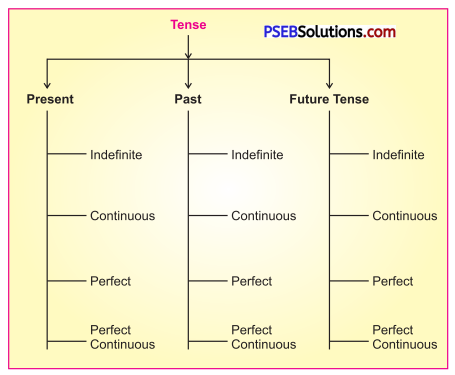
Continuous Present Indefinite (Simple Present)
1. to express what is actually taking place now, for example :
- Here comes the bride.
- There goes the bus.
![]()
2. to express a habitual action, for example :
- He gets up early in the morning.
- He takes exercise everyday.
- I go to school by bus.

3. to express some universal truth, for example :
- The earth moves round the sun.
- The sun rises in the east and sets in the west.
- The soul is immortal.
4. to express a situation or a fact that is permanent, for example :
- My house faces the east.
- This road runs from Ludhiana to Delhi.
5. to express a future action, when the futurity is indicated by them, for example :
- The college reopens next week.
- We leave by the 8.30 a.m. train.
Look at the tables below to understand how the present tense works.
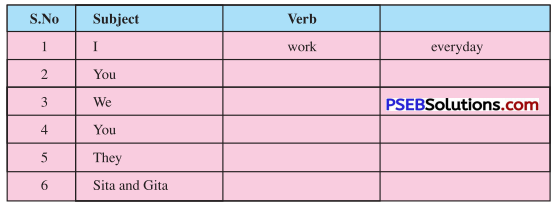
Answer:
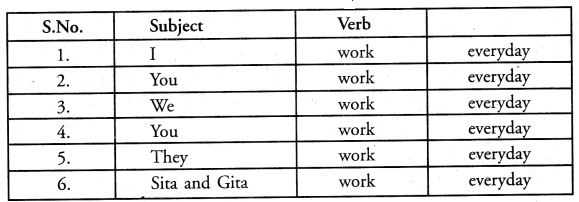
![]()
When we talk about singular subjects, we add-s/es to the verb. For example ‘he’, ‘she’ ‘iť and other singular subjects such as ‘this toy’, ‘the table etc.

Answer:

More examples :
(a) He drives to work.
(b) She works in an office.
(c) The bank opens at 9:00 a.m.
We do not use ‘be’ verb with the main verb in the simple present tense.
For example :
He works at a bank. (Correct)
He is work at a bank. (Incorrect)
Activity 6.
Underline the correct form of the verb to complete each sentence.
1. Priya love/loves her work.
2. He study/studies agriculture.
3. A salesperson sell/sells products for a company.
4. Sunita work/works in a bank.
5. Nurses help/helps people.
6. We write/writes English books.
7. Your office close/closes at 5:00 p.m.
8. She teach/teaches in a school.
9. I walk/walks to work everyday.
10. I start/starts work at 8:00 a.m. every morning.
Answer:
1. loves
2. studies
3. sells
4. works
5. help
6. write
7. closes
8. teaches
9. walk
10. start.
![]()
Present Continuous
It is used to express an action going on at the time of speaking. It is often associated with adverbs and adverb phrases, of present time, such as ‘now’, ‘at present, ‘at this moment’, etc.
For example :
- What are you doing now?
- Mohan is singing a song now.
This tense is sometimes used to mark an action that will happen in the future. For example :
- We are leaving for London tomorrow.
- She’s coming to meet me next week.
Activity 7.
Fill in the blanks with the correct form of the verb, Present Continuous or Present Simple.
1. I ……………… (not/belong) to Delhi.
2. Hurry! The bus …………….. (come).
3. Seema is a vegetarian. She ……………. (not/eat) meat
4. I ……………. (look) for a maid.
5. Jayati ……………. (eat) oranges.
6. At the moment, we ……………. (make) a video of the party.
7. I ……………… (know) what Mr Sharma wants to buy.
8. I …………….. (apply) for a job in a school but I don’t know if I will be successful.
9. Vanita ……………. (do) some research in the library.
10. She always ……………… (remember) my birthday.
11. Mr Brown …………… (work) in a supermarket.
12. Look! It ……………. (snow).
13. Do you …………… (know) Helen?
14. Look! That woman ……………. (try) to steal that man’s wallet.
15. The Ganges ……………. (flow) into the Bay of Bengal.
Answer:
1. do not belong
2. is coming
3. does not eat
4. am looking
5. eats
6. are making
7. know
8. am applying
9. is doing
10. remembers
11. works
12. is snowing
13. know
14. is trying
15. flows.
Present Perfect
This tense is used :
1. to express an action that has just been completed, for example :
- The sun has set.
- We have just arrived.
2. to express a past action the results of which still continue, for example:
- I have lived in Mumbai for ten years. (the speaker is still living in Mumbai)
- We have known each other for the past two years.
3. to express a Future Perfect when such words as ‘when’, ‘before’, ‘as soon as’, ’till, ‘after are used before it, for example :
- I shall go there after I have done my work. (as soon as I finish my work)
Present Perfect Continuous
It shows the action that began in the past and is continuing up to the present time, for example :
- I have been standing here for two hours.
- It has been raining since morning.
![]()
Note : In the Present Perfect Continuous tense, ‘since’ and ‘for are used to indicate point of time and period of time respectively, for example :
- We have been living here since 1955.
- Meena has been dancing since morning.
- The girls have been playing for three hours.
- It has been snowing for two hours.
Activity 8.
Fill in the blanks with the Present Perfect or Present Perfect Continuous forms of the verbs given in the brackets.
(a) Someone …………… the window. (break).
(b) Reeta …………….. her pen. (lose)
(c) We ……………. many medals. (win)
(d) I …………… for a house for two months. (search)
(e) The train ………….. just …………… at the platform. (arrive)
(f) ……………. he …………….. a beard ? (grow)
(g) …………….. you …………….. the Gita ? (read)
(h) I …………….. my uncle for months. (not visit)
(i) She …………….. to Paris twice. (be)
(j) We ……………. already …………. Our breakfast. (have)
Answer:
(a) has broken
(b) has lost
(c) have won
(d) have been searching
(e) has arrived
(f) Has, grown
(g) Have, read
(h) have not visited
(i) has been
(j) have, had.
Learning to Listen (Pairwork)
Activity 9.
Your teacher will tell you a story. Listen to it carefully and fill in the blanks with the words from the story. For the last paragraph, you will write all the words. The teacher will read the passage twice and the last part of the story will be read three times. Once upon a time, there was a shepherd who bought a …………. of sheep. He also had ……… who helped him to …………… his sheep. When the sheep grew up a little, the ………4…. realised that these sheep just …………….. not stop bleating. All day long, the sheep bleated-”Baaah baaah.” What a deafening sound they made; and they just ignored the ……………. commands. He used all the ……………. he could to get the sheep to listen to him and to his dog, but the …………….. didn’t care. Finally, seeing as the sheep wouldn’t stop …………….. the shepherd decided to at least have some ……10……. with it. He bought an enormous ear and transported it out to his fields on the ……..11….. of his wagon.
Answer:
1. flock
2. dog
3. control
4. shepherd
5. would
6. shepherd’s
7. means
8. sheep
9. bleating
10. fun
11. back
Learning to Speak (Pairwork)
Activity 10.
Take a currency note of any value. Describe the currency note to your partner. You must talk about various things that are there on the note and their colour, size, number, location
(where on the note) etc.
Answer:
Your partner will write/draw all the items that you describe on the currency note. You will take turns in describing. The teacher will look at the notes made by your partner to check whether the description matches with the drawing/writing.
Currency Note : ₹500
- Issued By : Reserve Bank of India
- Guaranteed by : The Central Government
- Colour : Stone grey
- Number : 3 NC 7…… 7
- Size : 63 mm x 150 mm
- Shape : Rectangular
Special feature (Design Elements)
- Picture of Mahatma Gandhi
- Picture of Red Fort (Historical Building)
- Picture of National Emblem
- Symbol of Swachh Bharat
![]()
Learning to write (Pairwork)
Activity 11.
Look at the picture below. The pictures are in a sequence. Work together and write a short story based on the pictures.
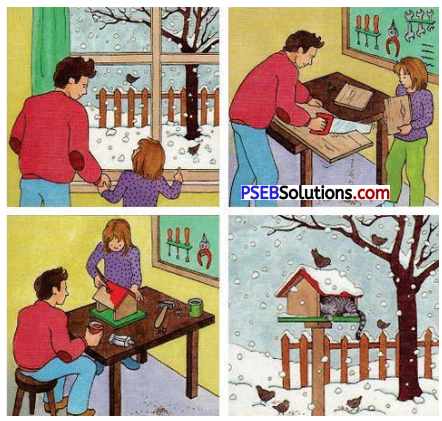
It was winter. The days were snowy. There was a thick sheet of snow on the earth. Trees was bare. Birds got no shelter, no food. Little Minni and her father came to their help. They took some cardboard and gum. They made a small hut for the birds. They put some food grains in it also. Now the little birds were happy.
Learning to Use the Language (Pairwork)
Read the following poster very carefully.
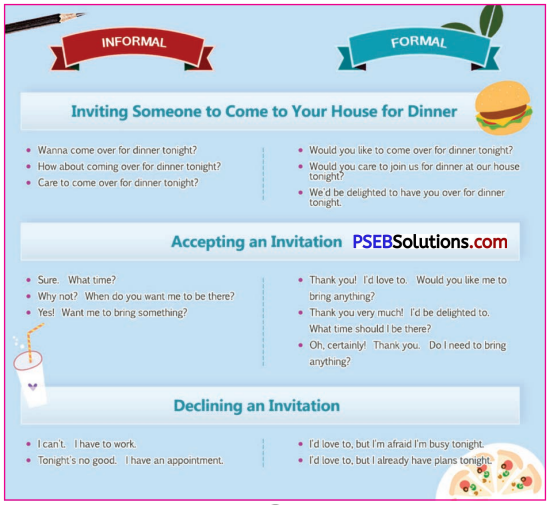
![]()
Activity 12.
Write the dialogue using the hints given in the poster on page
Partner 1 : Engage in a dialogue with your friend to invite him/her over to your home for dinner.
Partner 2 : Decline the invitation after asking questions about the day, time, occasion, etc.
Partner 1 : Hi Ramesh ! You are back to India. I am going to arrange a dinner party tonight. Would you like to come over for that ?
Partner 2 : What is the time? Where are you going to arrange it ? Is this some special occasion ?
Partner 1 : Tonight at 9 p.m. at hotel Sun. Forgot ! It is my birthday today.
Partner 2 : I’d love to come. But I’m afraid I am busy tonight.
Comprehension Of Stanzas
Read the following stanza (extract) and answer the questions given below each :
1. Some books I’ll never give away,
Though old and worn, their binding torn,
Upon my shelves they’ll always stay,
Alive, still read, still fresh each dawn,
Their magic moments never gone.
1. What shows the poet’s love for books ?
क्या बात पुस्तकों के प्रति कवि के प्रेम को व्यक्त करती है ?
2. What do the words ‘Their magic moments’ suggest ?
“Their Magic Moments” शब्द क्या सुझाव देते है?
3. Write in three or four sentences, the central idea of the poem.
तीन या चार पंक्तियों में कविता का केंद्रीय भाव लिखें।
Answer:
1. Some of the poet’s books are old and torn. Still he enjoys reading them everyday.
He keeps them on his shelves.
2. “Their magic moments’ means time for the poet to read his books. He reads them every morning.
3. Read C- ‘Central Idea of the poem.
![]()
नोट : अन्य Comprehension Stanzas के लिए Textual Exercises में दिए गए Comprehension का अध्ययन करें।
Word Meanings
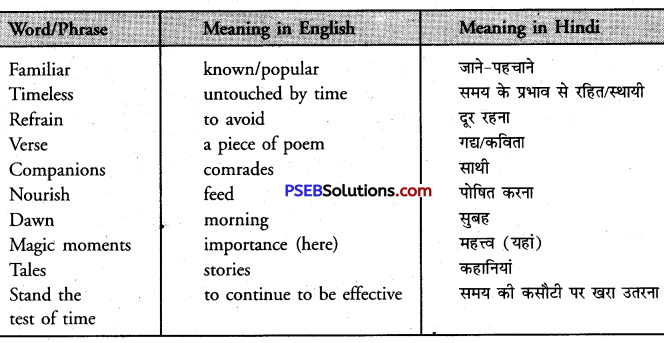
We Who Love Books Poem Summary in English
We Who Love Books Summary in English
Books have timeless value. They never become old. They are as fresh today as they were long ago. They are a big source of joy and information. The poet has great love for books. He loves reading books since he was ten. He keeps them on his shelves. Though the binding of some books is torn yet he never parts with them. He still reads them with the same interest. He calls them familiar and good friends.The poet says that great thoughts and great verse never lose their charm. They always stand the test of time. Lucky are those who love books.
We Who Love Books Summary in Hindi
पुस्तकों के महत्त्व की कोई समय सीमा नहीं होती। वे आज भी उतनी ही ताज़ा लगती हैं, जितनी वे बहुत समय पहले थीं। वे खुशी तथा जानकारी का बहुत बड़ा साधन हैं। कवि को पुस्तकों से बहुत अधिक प्रेम है। उसे दस साल की आयु से पुस्तकें पढ़ने से प्रेम है। वह उन्हें अपनी शेल्वज़ पर रखता है। यद्यपि उनमें से कुछ पुस्तकों की सिलाई खुल चुकी है, तो भी वह उन्हें वहां से कभी नहीं हटाता। वह अब भी उन्हें पूरी रुचि के साथ पढ़ता है। वह उन्हें जाने-पहचाने और अच्छे मित्र कह कर बुलाता है। कवि कहता है कि महान् विचारों तथा महान् काव्यांश का आकर्षण कभी समाप्त नहीं होता। वे समय की कसौटी पर खरे उतरते हैं। वे लोग भाग्यशाली हैं, जिन्हें पुस्तकों से प्रेम है।
![]()
Central Idea Of The Poem
The poem brings out the pleasure of reading. Love for books is a great blessing. It is a joy for ever. The books have everlasting value. The great thoughts of books are always fresh and stand the test of time. Therefore lucky are those who love books and enjoy books.
Class 8 PSEB Solutions Poetry
